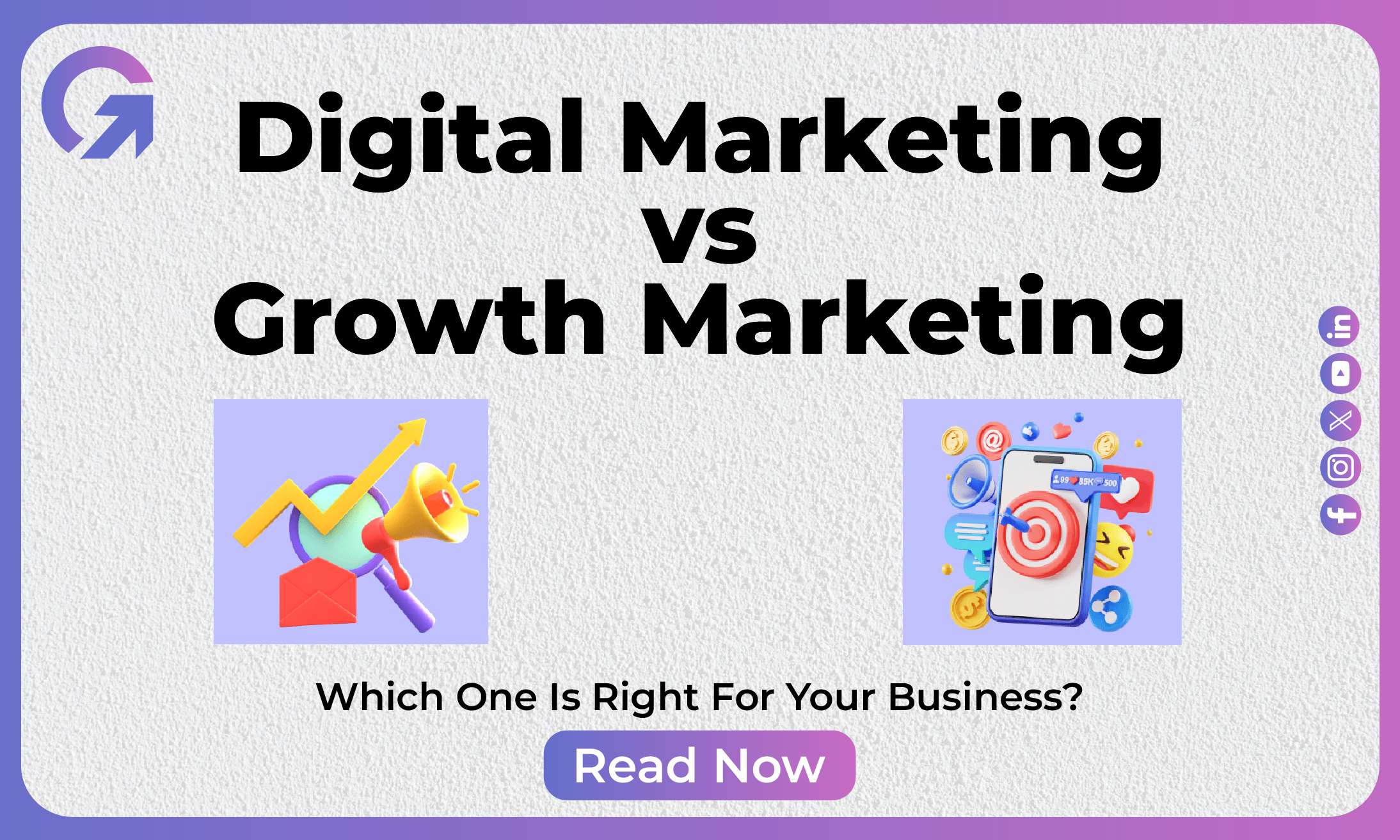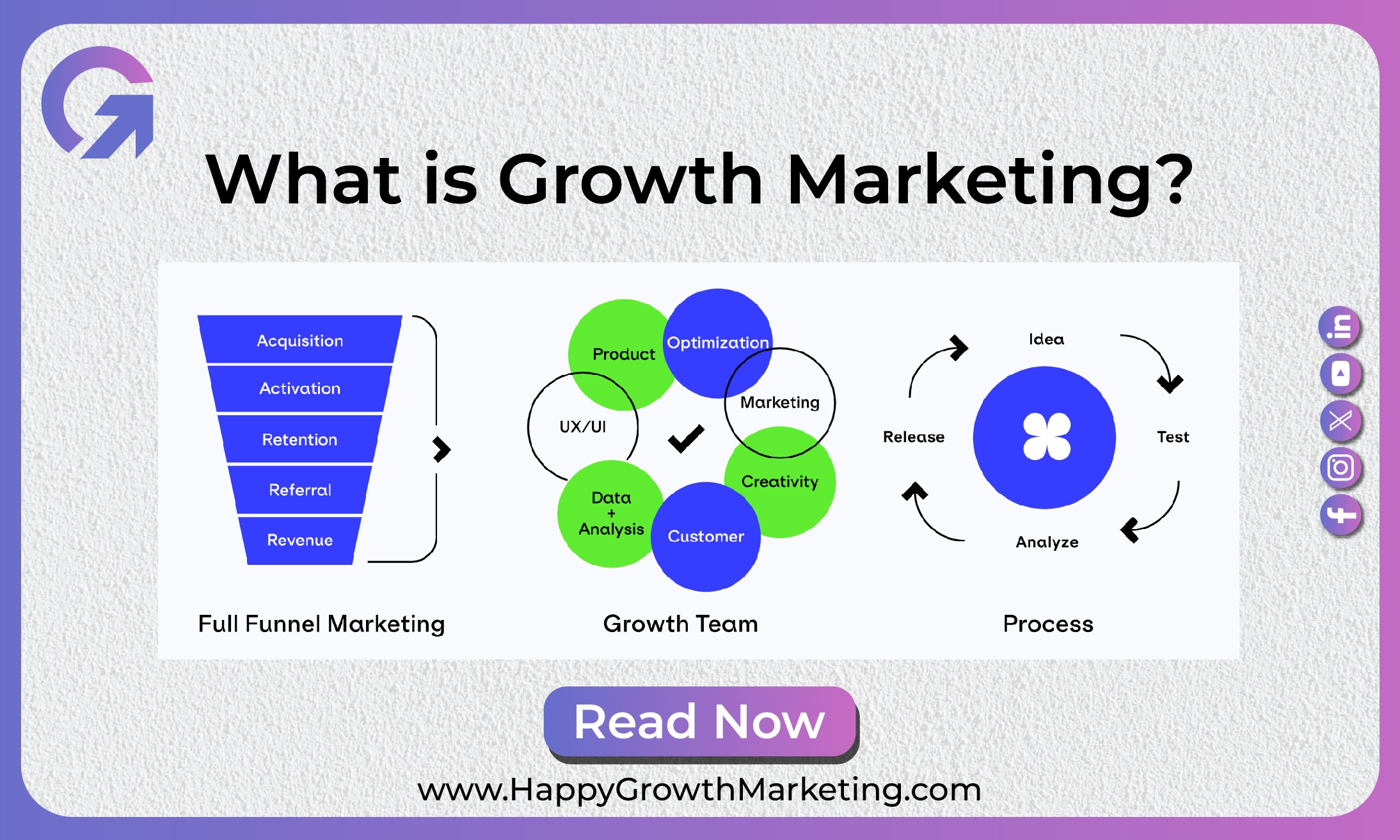Introduction
In today’s hyper-connected world, businesses are constantly seeking innovative ways to stand out in the digital landscape. Two prominent strategies that often come into play are Digital Marketing and Growth Marketing. While they might seem similar at first glance, there are distinct differences between the two approaches that can significantly impact the success of your business. Let’s delve into the nuances of Digital Marketing and Growth Marketing to determine which one aligns best with your business objectives.
what is the difference between Digital Marketing vs Growth Marketing?
Digital Marketing primarily focuses on leveraging online channels and establishing a strong digital presence. This includes tactics such as SEO, content marketing, social media marketing, and email marketing.
In contrast, Growth Marketing takes a more holistic approach, considering the entire customer journey and seeking sustainable growth across all touchpoints. It incorporates strategies like product development, customer retention, and viral marketing to drive rapid expansion.
Key Points:
- Scope: Digital Marketing concentrates on online platforms and tactics, while Growth Marketing looks at the broader picture, encompassing both online and offline strategies.
- Objectives: Digital Marketing aims for brand awareness, lead generation, and increasing website traffic. Growth Marketing strives for accelerated and sustained growth, focusing on customer acquisition, retention, and advocacy.
- Approach: Digital Marketing relies on established channels and tactics, optimizing them for better performance. Growth Marketing adopts a data-driven and experimental approach, constantly testing and iterating strategies to achieve exponential growth.
- Metrics: Digital Marketing measures success through metrics like website traffic, click-through rates, and conversion rates. Growth Marketing evaluates success based on metrics such as customer lifetime value, retention rate, and viral coefficient.
- Timeframe: Digital Marketing results are often more immediate, providing quick wins in terms of increased visibility and traffic. Growth Marketing takes a longer-term view, aiming for sustained growth over time.
By understanding the nuances between Digital Marketing and Growth Marketing, businesses can choose the approach that best aligns with their goals and resources, ultimately driving long-term success.
Differences Between Digital Marketing and Growth Marketing
Scope and Focus of Digital Marketing
Digital Marketing encompasses a broad range of online tactics aimed at promoting products or services. It includes strategies such as search engine optimization (SEO), content marketing, social media marketing, and email marketing. The primary goal of Digital Marketing is to increase brand visibility, drive website traffic, and ultimately, generate leads and conversions.
Scope and Focus of Growth Marketing
On the other hand, Growth Marketing goes beyond traditional marketing tactics. It focuses on scalable strategies that aim to accelerate business growth rapidly. Growth marketers adopt a data-driven approach, leveraging analytics and experimentation to identify opportunities for optimization. Growth Marketing prioritizes customer retention, product development, and virality, aiming to achieve exponential growth in a short period.
Key Strategies in Digital Marketing
SEO (Search Engine Optimization)
SEO is a cornerstone of High-Ticket Digital Marketing, centered around improving a website’s visibility in search engine results. By optimizing website content, implementing relevant keywords, and earning backlinks from reputable sources, businesses can enhance their organic search rankings. A robust SEO strategy ensures that your website ranks higher for relevant search queries, driving targeted traffic and increasing brand authority.
Content Marketing
Content Marketing involves creating and distributing valuable, relevant content to attract and engage a target audience. Whether it’s blog posts, infographics, videos, or podcasts, compelling content serves as a magnet, drawing potential customers to your website. By consistently delivering high-quality content that addresses the needs and interests of your audience, you can build trust, establish thought leadership, and drive conversions.
Social Media Marketing (SMM)
Social Media Marketing leverages popular social platforms such as Facebook, Instagram, Twitter, and LinkedIn to connect with audiences and promote products or services. With billions of active users worldwide, social media offers unparalleled opportunities for brand exposure and engagement. By crafting compelling content, engaging with followers, and running targeted advertising campaigns, businesses can amplify their reach and foster meaningful relationships with customers.
Email Marketing
Email Marketing remains a powerful tool for nurturing leads and fostering customer loyalty. Through personalized email campaigns, businesses can deliver relevant content, special offers, and product updates directly to subscribers’ inboxes. With automation tools and segmentation capabilities, email marketing enables businesses to tailor their messages based on user behavior, driving engagement and conversions.
Key Strategies in Growth Marketing
Product Development
Growth Marketing places a strong emphasis on continuous product iteration and improvement. By gathering feedback from customers, analyzing user data, and conducting experiments, businesses can identify areas for enhancement and innovation. Whether it’s adding new features, refining user experience, or addressing pain points, prioritizing product development is essential for sustainable growth.
Customer Retention
While acquiring new customers is important, retaining existing ones is equally crucial for long-term success. Growth marketers focus on building strong relationships with customers, ensuring satisfaction, and fostering loyalty. By implementing retention strategies such as personalized communication, loyalty programs, and proactive support, businesses can reduce churn rates and maximize lifetime customer value.
Viral Marketing
Viral Marketing aims to create content or campaigns that spread rapidly among users, generating massive exposure and engagement. Whether it’s a catchy video, a humorous meme, or a compelling social media challenge, viral content captivates audiences and encourages sharing. Growth marketers capitalize on viral trends, leveraging social networks and digital platforms to amplify reach and drive organic growth.
Choosing the Right Approach for Your Business
Assessing Business Goals
Before deciding between Digital Marketing and Growth Marketing, it’s essential to clarify your business objectives. Are you looking to increase brand awareness, drive immediate sales, or achieve rapid growth? Understanding your goals will help determine which approach aligns best with your overall strategy.
Understanding Target Audience
Knowing your target audience is key to crafting effective marketing campaigns. Digital Marketing may be more suitable for businesses targeting broad demographics across various channels, while Growth Marketing is ideal for startups and high-growth companies seeking rapid expansion among specific user segments.
Evaluating Resources and Budget
Consider your resources and budget constraints when choosing between Digital Marketing and Growth Marketing. While Digital Marketing tactics such as SEO and content marketing require ongoing investment in time and resources, Growth Marketing initiatives like viral campaigns and product development may necessitate a more significant upfront investment.
Case Studies and Examples
Successful Digital Marketing Case Study
One notable example of effective Digital Marketing is the campaign by Dollar Shave Club. Through witty and engaging content, targeted social media ads, and influencer partnerships, Dollar Shave Club disrupted the shaving industry, attracting millions of customers and ultimately leading to its acquisition by Unilever for $1 billion.
Successful Growth Marketing Case Study
Airbnb is a prime example of successful Growth Marketing. By leveraging a referral program that incentivized both hosts and guests, Airbnb achieved exponential growth, rapidly expanding its user base and global footprint. The strategic focus on customer acquisition and retention propelled Airbnb to become a household name in the hospitality industry.
Conclusion
In conclusion, both Digital Marketing and Growth Marketing offer valuable strategies for businesses seeking to thrive in the digital age. While Digital Marketing focuses on traditional tactics to increase brand visibility and drive conversions, Growth Marketing takes a more innovative and data-driven approach to achieve rapid and sustainable growth. Ultimately, the right approach for your business depends on your goals, target audience, and resources. By carefully evaluating these factors, you can choose the strategy that best aligns with your objectives and accelerates your business success.
Most Popular Questions
Frequently Asked Questions (FAQs)
Digital Marketing encompasses a broad range of online tactics aimed at promoting products or services, while Growth Marketing focuses on scalable strategies to achieve rapid business growth.
Evaluate your business goals, target audience, and available resources to determine whether Digital Marketing or Growth Marketing aligns best with your objectives.
Key strategies in Digital Marketing include SEO, content marketing, social media marketing, and email marketing.
Key strategies in Growth Marketing include product development, customer retention, and viral marketing.
Yes, many businesses employ a hybrid approach, integrating elements of both Digital Marketing and Growth Marketing to achieve optimal results.
Share this post :

Meet our experts at Happy Growth Marketing!
Our team shares valuable insights and strategies to help your business thrive online.














